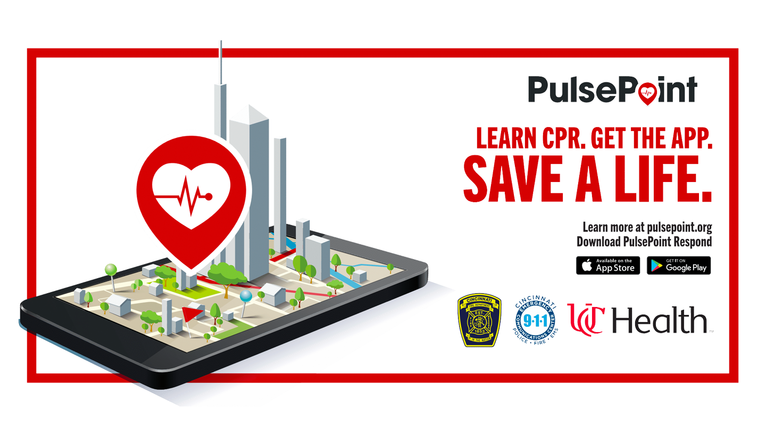“This app represents a strong collaboration between our health system and our crisis response network to better support residents in need,” Cincinnati Mayor Aftab Pureval said. “PulsePoint offers training and real-time information for residents to begin aid before our highly-skilled EMS crews arrive. This not only saves lives, but promotes a community where all our residents look out for each other.”
PulsePoint Respond is a 911-integrated mobile application that empowers everyday citizens to provide lifesaving assistance to victims of cardiac arrest. PulsePoint app subscribers who have indicated they are trained in cardiopulmonary resuscitation (CPR) and are willing to assist in case of an emergency can be notified if someone nearby needs CPR. The app also directs these potential rescuers to the exact location of the closest automated external defibrillator (AED).
“With PulsePoint, we hope to increase bystander involvement in time-sensitive medical calls by increasing the use of CPR and AEDs, while also keeping the community informed, in real-time, of all emergency activities,” Michael A. Washington Sr., fire chief for Cincinnati Fire Department said. “It gives our residents and visitors the ability to know when a cardiac arrest is occurring close by, locate AEDs in the area and perform potentially lifesaving CPR while personnel respond to the scene.”
This partnership fills a crucial need in our community that will educate and prepare citizens to respond to an emergency. According to the American Heart Association, 40% of cardiac arrests occur in public settings, where PulsePoint would apply. Of the 475,000 Americans that die from cardiac arrest each year, more than 350,000 occur outside of the hospital, making it the leading cause of death in the United States. The national average for bystander CPR rate is 46%; Cincinnati is well below that at 30%.
Without CPR, brain damage or death can occur in minutes. The average EMS response time is nine minutes, even in urban settings, and after 10 minutes, there is little chance of successful resuscitation. The American Heart Association estimates that effective bystander CPR can double or triple a person’s chance of survival.
“As the region’s leaders in emergency medicine, we know that prehospital care is directly connected to better outcomes for patients. In an emergency, seconds and minutes matter, especially those minutes before first responders arrive. We are proud to partner with Cincinnati Fire Department to bring PulsePoint to the people of Cincinnati,” Arthur M. Pancioli, MD, UC Health physician and the Richard C. Levy Chair of the Department of Emergency Medicine at the University of Cincinnati College of Medicine said.
UC Health has worked collaboratively with Cincinnati Fire Department and city of Cincinnati Emergency Communications to bring this lifesaving tool to the region. This partnership is the latest example of how the health system works with first responders to improve prehospital care. In 2020, UC Health launched the region’s first Mobile Stroke Unit to bring hospital-quality care directly to stroke victims in the community. UC Health’s emergency medicine physicians also train fire, police and EMS departments across Greater Cincinnati, and lead the region in emergency and disaster preparedness.
“Our PulsePoint partnership with UC Health and Cincinnati Fire Department furthers our mission at 911 to quickly get help to those who need it,” Bill Vedra, director of the Cincinnati Emergency Communications Center said. “Our goal is to ensure anyone suffering from cardiac arrest in our city has the chance to get the care they need at the hospital. PulsePoint will give them a chance to survive and will ensure that our citizens know what to do if they see someone nearby suffering from cardiac arrest.”
Volunteers can sign up through the app and can also participate in CPR/AED training sessions. Local residents do not have to have a clinical background to sign up and volunteer. To learn more about PulsePoint or to download the app, visit pulsepoint.org.
